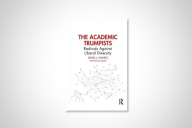You have /5 articles left.
Sign up for a free account or log in.
It should not be the case that a victory for the Department of Defense is a defeat for academic freedom, but such is the outcome of Rumsfeld v. FAIR, which the U.S. Supreme Court decided Monday in an 8-0 ruling favoring the government.
FAIR is the Forum for Academic and Institutional Rights, a group of prominent law schools whose policies forbid discrimination based on sexual orientation and other factors. FAIR sought to restrict, not prevent, military recruitment because the military’s discriminatory policy of “don’t ask, don’t tell” is aimed at gays and lesbians.
The U.S. military, on the other hand, supported by the Solomon Amendment, claims that its rights to see potential recruits in law schools and, indeed, in all other components of the university, trump the rights of universities to be true to their mission. The Solomon Amendment was first passed in 1995 by Congress and has been revised three times since, with each revision placing greater pressure on universities to give military recruiters less restricted access to students or face the prospect of losing all federal funding.
FAIR’s mission is “to promote academic freedom, support educational institutions in opposing discrimination and vindicate the rights of institutions of higher education.” This is “starry-eyed idealism,” according to one Congressman who supported the Solomon Amendment that “comes with a price” -- lose all federal funding unless you support the military’s discriminatory policy.
In some circles, such threats are called extortion, but coming from the government they are called “funding leverage.” The roughly $35 billion in federal money now going to universities would be lost if any component of the universities -- e.g., law schools or medical schools or education schools -- defied the Solomon Amendment.
For Chief Justice Roberts extortion is not “compelled speech” because all the government seeks to regulate is “conduct.” I liken this to my mother’s threats of denying me dinner following my making a reasoned objection to some unjust parental rule: it is your conduct, son, not the logic of your argument that offends; obey or no dinner.
As a child, I lacked the autonomy that universities have traditionally enjoyed in the United States. Institutional autonomy was described by the Global Colloquium of University Presidents, which met a year ago at Columbia University, as “the guarantor of academic freedom.” Institutional autonomy includes “the right of the university to determine for itself, on academic grounds, who may teach, what may be taught, how it shall be taught, and who may be admitted to study.”
The Roberts court ignores this tradition of academic common law and instead asserts that universities are “free” to determine their mission, including one that forbids discrimination, but only if they are willing to forgo access to the people’s money, the very funding that subsidizes new knowledge, new discoveries, and new policies, all for the purpose of assisting the public good.
The not insignificant crumb the Court did offer the academy in its Solomon [not Solomonic] ruling is the right of the academy to protest when military recruiters visit campus. Campus communities should vigorously exercise that right until such time as the US military changes its anti-discrimination policies to accord with the more enlightened of the academy.








